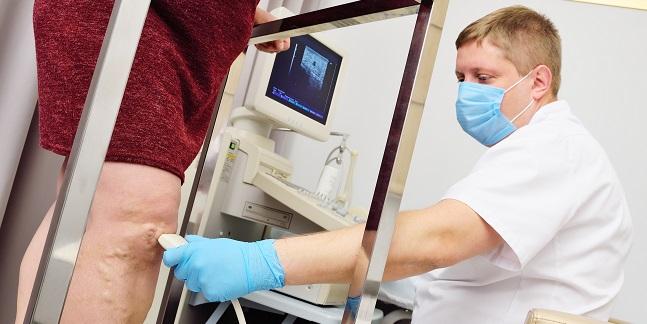New Advanced Training Outlined for Future Vascular Medicine Specialists
With level III training, physicians would learn key skills for the diagnosis and noninvasive treatment of complex vascular disease.

Level III training, which goes beyond skills developed during a general cardiology fellowship, is the focus of the new statement from the ACC, American Heart Association, Society for Vascular Medicine, and American College of Physicians in collaboration with other organizations, and this “pertains to advanced knowledge in diagnostic and therapeutic modalities for evaluating and managing vascular disease,” according to the ACC Competency Management Committee who drafted the report.
“The training statement is meant to provide the foundation for the knowledge, skills, and competencies that trainees should acquire during the conduct of an advanced fellowship in vascular medicine,” Mark Creager, MD (Dartmouth-Hitchcock Medical Center, Lebanon, NH), chair of the writing committee, told TCTMD. By design, the document does not include recommendations for training in catheter-based interventions.
The target audience of the new statement, which was published January 15, 2021, in Circulation: Cardiovascular Interventions, includes not only trainees undergoing an advanced fellowship in vascular medicine, but also faculty overseeing the training programs. “We hope to provide the information faculty would need to establish and sustain these programs,” said Creager. “We’re hopeful that this statement will provide the substrate for more vascular medicine training programs to develop over time, which in turn would accommodate a critical need for vascular medicine specialists.”
Naomi Hamburg, MD (Boston University School of Medicine, MA), co-chair of the writing committee, said that peripheral vascular disease is highly prevalent, particularly in the aging US population. Right now, there are approximately 10 million Americans living with PAD, but epidemiologic data suggest diagnosis is often delayed and patients are undertreated with proven therapies, such as cholesterol-lowering treatments and smoking-cessation interventions.
“This has led to an epidemic of late presentations and amputations that are really differentially distributed over this country,” Hamburg told TCTMD. “We hope that by outlining the components of the training, we’re going to expand the number of experts and expand access for our patients, with the ultimate goal of having people live healthier, longer lives.”
Teasing Out Interventions From Noninvasive Management
The emphasis of the Core Cardiology Training Statement 4 (COCATS 4), which forms the basis for general cardiology fellowships, is a competency-based program with individual reports that address subspecialties in cardiology. Level I training in a subspecialty, such as vascular medicine, is the basic training required as part of a general cardiology fellowship, while level II training teaches some physicians to perform specific procedures or how to provide more specialized care for patients with certain conditions. In vascular medicine, this might include interpreting noninvasive diagnostic tests and evaluating/managing patients with peripheral vascular disease.
In the new statement, which outlines the basis for level III training, the writing committee highlights several required aspects of a training program, including teaching, clinical experience, hands-on procedural experience, and the diagnosis and management of emergencies and complications. “[Training] really involves becoming a vascular medicine expert where you’re going to be the person consulted for complex cases,” said Hamburg, adding that physicians with level III training would also be capable of leading a vascular diagnostic laboratory.
The didactic program for level III vascular medicine training should include, but not be limited to, areas such as PAD, renal and mesenteric artery disease, cerebrovascular disease, aortic diseases, vasculitis, vasospastic and temperature-related diseases, acute and chronic venous diseases, and lymphatic diseases. Teaching can take the form of lectures, online modules, journal clubs, grand rounds, clinical cases, conferences, and simulation-based training, the paper suggests. For clinical experience, the specialist should learn the skills to interpret their patients’ clinical presentation, plan diagnostic testing, apply clinical and laboratory information, and develop a management plan.
“Advanced vascular medicine training certainly includes the prevalent diseases, such as those related to atherosclerosis, including peripheral artery disease, carotid artery disease, and aortic diseases, and venous thromboembolism,” said Creager. “Most cardiologists have fundamental knowledge about how to approach and treat these disorders, but oftentimes additional experience and skills are needed to manage these patients. In addition to that, vascular medicine physicians see uncommon vascular disorders, whether it’s vasculitis or vasospastic disorders or vascular diseases less frequently encountered in cardiology training programs, such as venous insufficiency and lymphedema.”
The 2021 paper is a revision of the 2004 clinical competence statement on vascular medicine and catheter-based peripheral vascular interventions. To TCTMD, Creager said the latest version is based on achieving competency-based training and performance, which is endorsed by the American Board of Internal Medicine, that can be evaluated, as opposed to historic methods of quantifying training based on volume, as just one example. Another major change is that the present statement is focused on advanced training for vascular medicine and does not include training in catheter-based peripheral procedures.
“This statement is focused on the noninvasive evaluation and medical management of patients with vascular disease,” said Creager.
Whereas training recommendations for catheter-based peripheral interventions were included in the 2004 statement, they are not included in the 2021 document. A separate advanced training statement on catheter-based peripheral interventions will likely be forthcoming, he said.
Creager added that cardiologists training in interventional vascular procedures wouldn’t necessarily need to master all the skills that are part of level III vascular medicine training, although there are components interventionalists will need to know as well, particularly regarding non-coronary atherosclerotic disease and venous disorders, and noninvasive vascular testing. To TCTMD, Hamburg also emphasized that advanced knowledge of vascular medicine is important for interventionalists, although this new training statement is not specifically directed at them.
Michael O’Riordan is the Managing Editor for TCTMD. He completed his undergraduate degrees at Queen’s University in Kingston, ON, and…
Read Full BioSources
Creager MA, Hamburg NM, Calligaro KD, et al. 2021 ACC/AHA/SVM/ACP advanced training statement on vascular medicine (revision of the 2004 ACC/ACP/SCAI/SVMB/SVS clinical competence statement on vascular medicine and catheter-based peripheral vascular interventions). Circ Cardiovasc Intv. 2021;Epub ahead of print.
Disclosures
- Creager reports no relevant conflicts of interest.
- Hamburg reports consulting for Amgen, Bayer, Merck, and Sanifit.






Comments